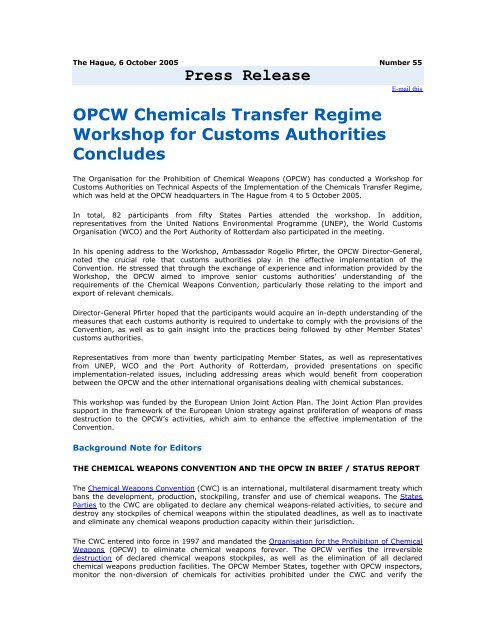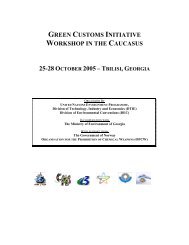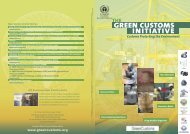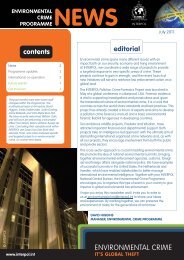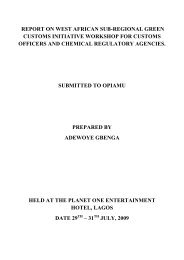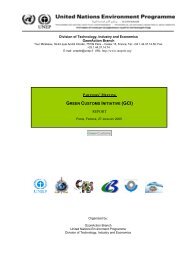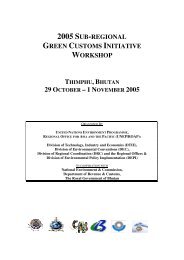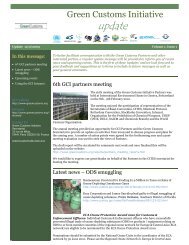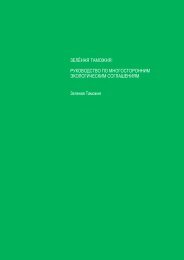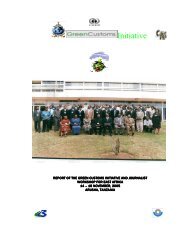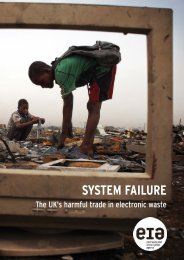Press Release OPCW Chemicals Transfer Regime Workshop for ...
Press Release OPCW Chemicals Transfer Regime Workshop for ...
Press Release OPCW Chemicals Transfer Regime Workshop for ...
Create successful ePaper yourself
Turn your PDF publications into a flip-book with our unique Google optimized e-Paper software.
The Hague, 6 October 2005 Number 55<strong>Press</strong> <strong>Release</strong>E-mail this<strong>OPCW</strong> <strong>Chemicals</strong> <strong>Transfer</strong> <strong>Regime</strong><strong>Workshop</strong> <strong>for</strong> Customs AuthoritiesConcludesThe Organisation <strong>for</strong> the Prohibition of Chemical Weapons (<strong>OPCW</strong>) has conducted a <strong>Workshop</strong> <strong>for</strong>Customs Authorities on Technical Aspects of the Implementation of the <strong>Chemicals</strong> <strong>Transfer</strong> <strong>Regime</strong>,which was held at the <strong>OPCW</strong> headquarters in The Hague from 4 to 5 October 2005.In total, 82 participants from fifty States Parties attended the workshop. In addition,representatives from the United Nations Environmental Programme (UNEP), the World CustomsOrganisation (WCO) and the Port Authority of Rotterdam also participated in the meeting.In his opening address to the <strong>Workshop</strong>, Ambassador Rogelio Pfirter, the <strong>OPCW</strong> Director-General,noted the crucial role that customs authorities play in the effective implementation of theConvention. He stressed that through the exchange of experience and in<strong>for</strong>mation provided by the<strong>Workshop</strong>, the <strong>OPCW</strong> aimed to improve senior customs authorities’ understanding of therequirements of the Chemical Weapons Convention, particularly those relating to the import andexport of relevant chemicals.Director-General Pfirter hoped that the participants would acquire an in-depth understanding of themeasures that each customs authority is required to undertake to comply with the provisions of theConvention, as well as to gain insight into the practices being followed by other Member States’customs authorities.Representatives from more than twenty participating Member States, as well as representativesfrom UNEP, WCO and the Port Authority of Rotterdam, provided presentations on specificimplementation-related issues, including addressing areas which would benefit from cooperationbetween the <strong>OPCW</strong> and the other international organisations dealing with chemical substances.This workshop was funded by the European Union Joint Action Plan. The Joint Action Plan providessupport in the framework of the European Union strategy against proliferation of weapons of massdestruction to the <strong>OPCW</strong>’s activities, which aim to enhance the effective implementation of theConvention.Background Note <strong>for</strong> EditorsTHE CHEMICAL WEAPONS CONVENTION AND THE <strong>OPCW</strong> IN BRIEF / STATUS REPORTThe Chemical Weapons Convention (CWC) is an international, multilateral disarmament treaty whichbans the development, production, stockpiling, transfer and use of chemical weapons. The StatesParties to the CWC are obligated to declare any chemical weapons-related activities, to secure anddestroy any stockpiles of chemical weapons within the stipulated deadlines, as well as to inactivateand eliminate any chemical weapons production capacity within their jurisdiction.The CWC entered into <strong>for</strong>ce in 1997 and mandated the Organisation <strong>for</strong> the Prohibition of ChemicalWeapons (<strong>OPCW</strong>) to eliminate chemical weapons <strong>for</strong>ever. The <strong>OPCW</strong> verifies the irreversibledestruction of declared chemical weapons stockpiles, as well as the elimination of all declaredchemical weapons production facilities. The <strong>OPCW</strong> Member States, together with <strong>OPCW</strong> inspectors,monitor the non-diversion of chemicals <strong>for</strong> activities prohibited under the CWC and verify the
consistency of industrial chemical declarations. In addition, <strong>OPCW</strong> States Parties undertake toprovide protection and assistance, if chemical weapons have been used against a State Party, or ifsuch weapons threaten a State Party. The CWC also calls <strong>for</strong> international cooperation in thepeaceful use of chemistry.The CWC is the single disarmament agreement that in its daily application around the world is usedto verify the on-going elimination of an entire category of weapons of mass destruction, chemicalweapons. <strong>OPCW</strong> inspections are conducted in dozens of countries, where both military and industrialsites are subject to verification. The verification procedures and the declaration obligations of theStates Parties are applied in an entirely non-discriminatory manner, following protocols negotiatedand adopted in intensive and transparent multilateral negotiations. All States Parties enjoy the samerights and bear the same obligations, regardless of their declared possession of chemical weapons.The global chemical weapons ban is approaching universality: as of 16 October 2005, 174 Stateswill be party to the CWC and have taken the sovereign decision to renounce chemical weapons inperpetuity, while voluntarily complying with a strict verification regime. Together, these countries<strong>for</strong>m the <strong>OPCW</strong>. Only 20 States have not as yet acceded or ratified the CWC. Every country is urgedto accede to, or ratify, the Chemical Weapons Convention so that the development, production,stockpiling, transfer and use of chemical weapons is illegal everywhere. Universality of the CWC is akey priority in establishing a global and permanent ban of chemical weapons.The CWC's international jurisdiction and deterrent effect is bolstered by the steadily expandingmembership of the <strong>OPCW</strong>, now encompassing over 95% of the global population, as well as 98% ofthe relevant global chemical industry. The broad coverage of this disarmament treaty, the mostcomplex and comprehensive international agreement of its kind ever to be adopted, grants Statesparty to the CWC an ever more robust assurance that chemical weapons will no longer bedeveloped, produced, stockpiled, used or transferred.<strong>OPCW</strong> Status ReportSix States Parties have declared chemical weapons and must destroy over eight million items,including munitions and containers —in total, over seventy-one thousand metric tonnes ofextremely toxic chemical agents. By comparison, one drop of a nerve agent, no larger than thehead of a pin, can kill an adult within minutes after exposure.Every Member State must introduce and apply legislation to make the development, production,use, stockpiling or transfer of chemical weapons by any person or group illegal. Severe penaltiesmust be imposed should this crime be committed. Each Member State is obliged to provide otherMember States with its fullest cooperation so as to expedite prosecution.To make sure that the Convention is implemented effectively, Member States are obliged todesignate or establish a “National Authority”. This body participates in and coordinates <strong>OPCW</strong>inspections of relevant industrial or military sites, makes initial and annual declarations, participatesin assisting and protecting those Member States which are threatened by, or have indeed suffered,a chemical attack, and fosters the peaceful uses of chemistry. In addition, the National Authorityacts as the focal point in the State Party's interaction with other States Parties and the <strong>OPCW</strong>'sTechnical Secretariat. The <strong>OPCW</strong> Technical Secretariat has established a coordinated mechanism tosupport Member States in their national implementation of the Convention. The focus of this work isto provide advice and assistance to the staff of National Authorities in order to help them enhancetheir skills and expertise.100% of the declared chemical weapons production facilities (CWPFs) have been deactivated. All aresubjected to a verification regime of unprecedented stringency. Over 75% of the declared CWPFshave been eliminated. Over 25% of the 8.6 million chemical munitions and containers covered bythe Convention have been verifiably destroyed. Nearly 17% of the world's declared stockpiles ofapproximately 71,000 metric tonnes of chemical agent have been verifiably destroyed. Over 2,000on-site inspections have been conducted in over 70 States Parties to verify compliance with theCWC.
States not partyTwelve States have signed but have not yet ratified the Chemical WeaponsConvention as at 3 October 20051. Bahamas (Date of Signature: 02-03-94)2. Central African Republic (14-01-93)3. Comoros (13-01-93)4. Congo (15-01-93)5. Democratic Republic of the Congo (14-01-93)6. Djibouti (28-09-93)7. Dominican Republic (13-01-93)8. Guinea-Bissau (14-01-93)9. Haiti (14-01-93)10. Israel (13-01-93)11. Liberia (15-01-93)12. Myanmar (14-01-93)Eight States have not yet acceded to the Chemical Weapons Convention as at 3October 20051. Angola2. Barbados3. Democratic People’s Republic of Korea4. Egypt5. Iraq6. Lebanon7. Somalia8. Syrian Arab RepublicFOR INFORMATION — NOT AN OFFICIAL RECORDFor further in<strong>for</strong>mation please contact: Media and Public Affairs Branch, + 31 (0) 70 416 3710,media@opcw.org,Johan de Wittlaan 32, 2517 JR The Hague, The Netherlands.Conference of the States PartiesExecutive CouncilTechnical SecretariatConfidentiality CommissionScientific Advisory BoardAdvisory Body on Admin. & Financial MattersOther International AgreementsUniversality of the CWCIntroductionChairperson of the ConferenceRules of ProcedureHistory of Chemical Weapons


